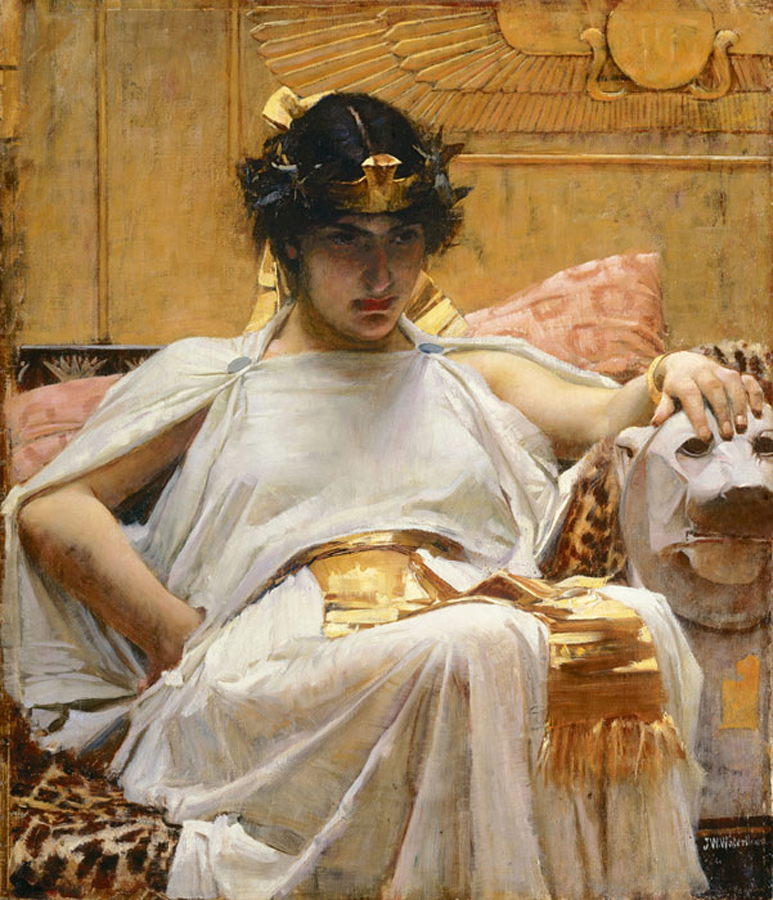Introduction to our series Death of Antony and Cleopatra:
You’ve seen the movies. Maybe you’ve even seen the mini-series. You’ve read Shakespeare’s play. Maybe you’ve even watched a production of it. Or you can listen to it here.
Now read the real story. It is more than just a romantic drama. It is also the story of the end of the Roman Republic and the birth of the Empire.
Henry George Liddell (1811 – 1898) was a professor who rose to be Vice-Chancellor of Oxford University. He wrote the book on ancient Rome. Here’s the authoritative account of this classic and important story. And now, Henry George Liddell.
Time: August 30 BC
Place: Alexandria, Egypt
 |
| Cleopatra by John William Waterhouse, 1888.
Public domain image from Wikipedia.
|
In the evening Cicero, with other senators, visited the self-styled liberators in the Capitol. They had not communicated their plot to the orator, through fear (they said) of his irresolute counsels; but now that the deed was done, he extolled it as a godlike act. Next morning, Dolabella, Cicero's son-in-law, whom Caesar had promised should be his successor in the consulship, assumed the consular fasces and joined the liberators; while Cinna, son of the old Marian leader and therefore brother-in-law to Caesar, threw aside his praetorian robes, declaring he would no longer wear the tyrant's livery. Dec. Brutus, a good soldier, had taken a band of gladiators into pay, to serve as a bodyguard of the liberators. Thus strengthened, they ventured again to descend into the Forum. Brutus mounted the tribune, and addressed the people in a dispassionate speech, which produced little effect. But when Cinna assailed the memory of the dictator, the crowd broke out into menacing cries, and the liberators again retired to the Capitol.
That same night they entered into negotiations with Antony, and the result appeared next morning, the second after the murder. The senate, summoned to meet, obeyed the call in large numbers. Antony and Dolabella attended in their consular robes, and Cinna resumed his praetorian garb. It was soon apparent that a reconciliation had been effected: for Antony moved that a general amnesty should be granted, and Cicero seconded the motion in an animated speech. It was carried; and Antony next moved that all the acts of the dictator should be recognized as law. He had his own purposes here; but the liberators also saw in the motion an advantage to themselves; for they were actually in possession of some of the chief magistracies, and had received appointments to some of the richest provinces of the empire. This proposal, therefore, was favorably received; but it was adjourned to the next day, together with the important question of Caesar's funeral.
On the next day Caesar's acts were formally confirmed, and among them his will was declared valid, though its provisions were yet unknown. After this, it was difficult to reject the proposal that the dictator should have a public burial. Old senators remembered the riots that attended the funeral of Clodius and shook their heads. Cassius opposed it. But Brutus, with imprudent magnanimity, decided in favor of allowing it. To seal the reconciliation, Lepidus entertained Brutus at dinner and Cassius was feasted by Mark Antony.
The will was immediately made public. Cleopatra was still in Rome, and entertained hopes that the boy Caesarion would be declared the dictator's heir; for though he had been married thrice, there was no one of his lineage surviving. But Caesar was too much a Roman, and knew the Romans too well, to be guilty of this folly. Young C. Octavius, his sister's son, was declared his heir. Legacies were left to all his supposed friends, among whom were several of those who had assassinated him. His noble gardens beyond the Tiber were devised to the use of the public, and every Roman citizen was to receive a donation of three hundred sesterces--between ten and fifteen dollars. The effect of this recital was electric. Devotion to the memory of the dictator and hatred for his murderers at once filled every breast.
Continued on Wednesday, March 18th.
More information on Marc Antony from History.com, on Cleopatra from The Smithsonian and National Geographic Magazines.
No comments:
Post a Comment